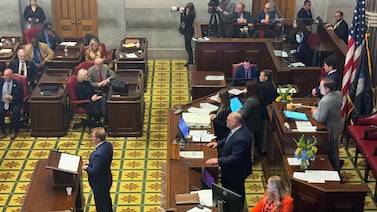The former head of an Indianapolis school alleges the school board let him be defamed in a termination proceeding that violated state law and essentially canceled him, according to a tort claim and a federal discrimination complaint filed in March and April, respectively.
Nathan Tuttle, the former CEO and executive director of the Edison School of the Arts, is seeking at least $300,000 in damages from the school in a tort claim, which individuals must file in Indiana and have denied in whole or in part before suing a government entity. He also filed a complaint with the Equal Employment Opportunity Commission (EEOC), often the first step before filing a federal discrimination lawsuit.
Edison’s board terminated Tuttle in March after allegations from parents and staff that he used a racial slur when speaking to Black students; Tuttle countered in the claim and EEOC complaint that he repeated the slur while disciplining a student who had used it, but did not direct the slur at a student. He also alleges staff at the school let students chant homophobic insults about him during an on-campus protest.
The allegations against Edison mark an escalation in hostilities between the school’s former CEO and the Edison community at large. A public meeting in March to address the incident boiled over when parents, students, and staff publicly criticized what they called a toxic working and learning environment under Tuttle’s administration. The school board fired Tuttle a week later.
Tuttle’s allegations also come as Edison wraps up a challenging school year and tries, under new leadership, to change the school’s climate. After the public fallout following Tuttle’s dismissal, the board halted its plans to expand its programming into James Whitcomb Riley School 43.
Tuttle alleges he was also deprived of his due process rights under the 14th Amendment, which would allow him an opportunity to clear his name at a pre-termination hearing.
“He has, in effect, been cancelled,” the documents state. “The mob mentality that was allowed to pervade the Edison Board meeting on March 7th, carried over to their decision to terminate Tuttle.”
In a statement from the school’s executive committee of the board of directors, the school denied all allegations made in the complaints — noting that as an Innovation school in Indianapolis Public Schools, Edison is not required to comply with termination proceedings outlined in state law for traditional public schools.
The school also argued that its investigation into the incident gave Tuttle the opportunity to weigh in and respond to the public allegations at length.
“The Board appreciates the service that Mr. Tuttle made to the School, but will be clear that Mr. Tuttle was terminated in compliance with Indiana state statute and pursuant to the requirements to release an at-will employee,” the committee said.
A spokesperson for IPS did not provide comment.
Tuttle: Traditional public school labor protections should apply
In both complaints, Tuttle is seeking two years worth of his $150,000 annual salary at Edison, plus bonuses and benefits. They also seek unspecified compensation for damage to his reputation.
A key dispute between Tuttle and Edison is the interpretation of state law governing Innovation Network schools, which have more autonomy in staffing and operations than traditional public schools. Innovation schools do not have to follow a collective bargaining agreement with a union, for example.
Tuttle’s attorney, Chip Clark, said the school breached his three-year contract that began in 2022. Both the tort claim and EEOC complaint cite state law that governs “regular teacher contracts” for traditional public schools and notes that Tuttle was also a choir teacher at the school. The board’s policy also requires the CEO to be employed in the form of a regular teacher’s contract, argued Clark.
The complaints also cite due process rights for school superintendents outlined in state law, which states that a superintendent can only be terminated for cause and can request a hearing before the school’s governing body when the board decides not to renew a superintendent contract.
But Edison argued that those statutes do not apply to Tuttle, and that he was an at-will employee of the nonprofit that operates Edison.
State law gives operational autonomy to Innovation schools, and says other statutes applicable to school corporations do not apply to them. While most IPS Innovation schools are run by charter operators, Edison is one of the few that is run by a nonprofit with its own board instead.
The school argued that Tuttle’s assertions are “further evidence that Mr. Tuttle did not understand his role as an Innovation School Leader.”
“Mr. Tuttle was terminated by the Board for his failure to comply with employee policies and procedures, lack of leadership and management of the school, significant concerns raised by numerous employees as part of the Board’s employment investigation, among other reasons,” the committee said in its statement.
If the school deemed Tuttle’s work unsatisfactory, the board’s policy requires it to give Tuttle opportunity to correct the conditions, which the board did not do, the complaints argue. But the school through its attorney argued that this policy only applies to the renewal or non-renewal of the CEO’s contract, and that the policy also states the board may terminate the CEO’s contract during its term in accordance with the law.
Both complaints also allege the school discriminated against him based on race and sexual orientation, noting that Tuttle is a gay white male who is the father of a Black child.
The complaints also claim that in a protest during lunch on March 3 that appeared on social media, Edison students called Tuttle homophobic slurs while he was on leave.
“The teachers and administrators in charge of Edison during Tuttle’s administrative leave allowed this to happen,” Tuttle’s complaints state.
Amelia Pak-Harvey covers Indianapolis and Marion County schools for Chalkbeat Indiana. Contact Amelia at apak-harvey@chalkbeat.org.







